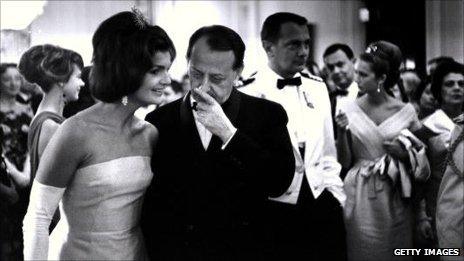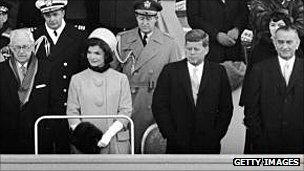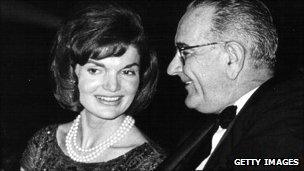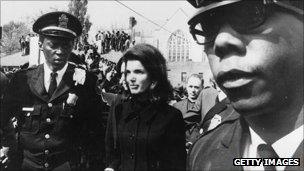The Jackie Kennedy tapes: Sharp, tender and gossipy
- Published

Jackie came up with the term "Camelot" to refer to the Kennedy White House
Of all the treasures held by the Kennedy presidential library in Boston, few have held such a hold on scholars' imagination as the Jackie Kennedy tapes - the seven-part interview with her friend, historian and White House aide Arthur M Schlesinger Jr, conducted not long after her husband's assassination.
Though the subject of enormous conjecture, most historians tried to banish these recordings from their minds. After all, the former First Lady had issued the strictest of decrees that her oral history should not be released to the public until 50 years after her death: May 19th, 2044.
For so long out of bounds, the tapes have now been put in the public domain. Her daughter, Caroline Kennedy, decided that the recordings should be released to mark the 50th anniversary of the Kennedy presidency.
Jackie was a central character in Camelot - an historical allusion that she herself came up with, in another of the three interviews she gave in the aftermath of that awful day in Dallas - and Caroline decided that her voice should augment the historical record.
And what a voice it is - at once sharp, tender, political, sassy, breathless (as was her style), self-deprecating and deliciously gossipy.
Also interesting to note is the extent to which her thoughts are so closely aligned with those of her late husband's. Tellingly, his favourites were her favourites:
Robert Kennedy, the attorney general who doubled as the President's political consigliere
Robert McNamara, the defence secretary who Kennedy recruited from the Ford motor corporation
McGeorge Bundy, his brainy national security adviser
Similarly, his adversaries were her adversaries - Vice-president Lyndon Baines Johnson, and Martin Luther King, of whom more later.
Rows

Jackie Kennedy popularised the pillbox hat simply by wearing it at her husband's inauguration
This should not come as any great surprise. After all, Jackie Kennedy was just 31 when her husband took the oath of office. She was young, impressionable, and far from being the identikit political wife.
Jackie knew as much, and told Schlesinger: "I was always a liability to him, everyone thought I was a snob from Newport who had bouffant hair and had French clothes and hated politics."
Here, perhaps with false modesty, she underestimated her contribution to JFK's presidency. Indeed, much of the New Frontier's style and elan came from her exquisite sense of culture, class and fashion.
This was the woman who popularised the pillbox hat simply through wearing it at her husband's inauguration - just as her husband ended the fashion of male hat-wearing by refusing ever to be seen in headgear.
On the subject of her marriage, she says her aim was to provide "a climate of affection and comfort and detente" and maintains that the couple never really had a fight. The impression given is of a happy, if old-fashioned, relationship.
This is particularly interesting, partly because it camouflages the rows that the couple are known to have had over the president's serial adultery and partly because it counters what Kennedy scholars had long speculated to be the main reason for her 50-year rule governing the availability of her oral history - that she had confided in Schlesinger about the president's marital infidelity.
During the interviews, she speaks of a "civilized side of Jack" and a "sort of a crude side," but then quickly contradicts herself: "Not that Jack had the crude side."
In this context, her comments about retiring to bed early on the night of the inauguration have an unintended significance. That was the very night Kennedy committed his first adulterous act as president.
For the less prurient, the sections on Cuba are of enormous interest. Jackie describes how her husband wept in their bedroom at news of the Bay of Pigs, the disastrous CIA-backed attempted invasion of Cuba in 1961 that amplified questions early in his presidency over whether he was truly up to the job. So outwardly confident, Kennedy went through an uncharacteristic bout of introspection after the debacle.
The following year, during the missile crisis that brought the world to the brink of Armageddon, she gives voice to the mood of fatalism that was shared by many within the administration at the time.
"If anything happens, we're all going to stay right here with you," she reportedly told her husband in October 1962. "I just want to be with you, and I want to die with you, and the children do, too — than live without you."
On this, she was adamant: "I said, 'Please don't send me away to Camp David, me and the children. Please don't send me anywhere, if anything happens we're all just going to stay right here with you."
The tapes contain other humanising details, including the president's nightly prayer ritual. "It was just like a little childish mannerism, I suppose like brushing your teeth or something," she says. "But I thought that was so sweet. It used to amuse me so, standing there."

Jackie Kennedy: "Lyndon as vice-president didn't just do anything"
Given what we now know about Kennedy's playboy presidency - which, in many ways, was a pornographic presidency - this, again, is intriguing. It highlights the difference between what might be called the Saturday night Kennedy and the more pious Sunday morning Kennedy.
Perhaps the most headline-grabbing sections of the tape involve LBJ and MLK - although for those who have studied the Kennedy years, these comments come as less of a surprise.
Kennedy was contemptuous of his vice-president, just as LBJ was scornful of his boss. Jackie comments that JFK noted: "Oh, God, can you ever imagine what would happen to the country if Lyndon was president?"
But the feeling was mutual, as we have known for a long while.
"It was the goddamnedest thing," LBJ once said. "Here was a young whippersnapper, malaria-ridden and yellah, sickly, sickly. He never said a word of importance in the Senate and he never did a thing. But somehow with his books and his Pulitzer prizes he managed to create the image of himself as a shining intellectual, a youthful leader who could change the face of the country."
Jack Kennedy often complained that his unhappy vice-president failed to contribute in policy discussions and wallowed in self-pity. Again, the Jackie tapes offer confirmation: "Jack would say you could never get an opinion out of Lyndon at any cabinet or national security meeting. He'd just say, you know, that he agreed with them - with everyone - or just keep really quiet. So Lyndon, as vice-president, didn't just do anything."
Treasure trove
Towards Martin Luther King, Jackie Kennedy reveals a surprising degree of hostility. She calls the civil rights leader "terrible", "tricky", and "phony" partly because of his own marital infidelities.

Jackie Kennedy, seen here at Martin Luther King's funeral, was a friend of the civil rights movement
Caroline Kennedy has tried to explain this by saying her mother was influenced heavily by the then FBI director J Edgar Hoover, who believed King was a communist and handed Kennedy "dirt files" on MLK. But it is also worth noting that Jack Kennedy regarded King as an irritant during his presidency, largely because the civil rights movement exposed the then chasm within the Democratic Party between its liberal northern wing and segregationist southern bloc.
Tellingly, the Kennedy brothers' first response to the March on Washington, at which King delivered his famed I Have a Dream speech, was to pressure civil rights leaders to call it off. Fearing a massive race riot, they then orchestrated one of the biggest military deployments in American peacetime history to prevent any outbreak of violence.
No wonder, then, that Jackie viewed MLK with such suspicion, for the political problems posed by the civil rights movement dominated the final year of her husband's life. Indeed, they threatened to wreck his presidency.
Here, though, it is worth pointing out that Jackie was supportive of black enfranchisement and an end to racial apartheid in the South.
Indeed, during an era when politicians often went to address black audiences unaccompanied by their wives, Jackie was more than happy to shake the "Negro" hand. Despite her comments about Dr King, she was a friend of the civil rights movement - sometimes more so than her husband.
In conclusion, it is worth remembering what a treasure trove these tapes truly are. Kennedy scholars will feel much like an Egyptian archaeologist who has known of a pyramidal chamber but been prevented from levering back the door. Kennedy did not live long enough to become an American pharaoh, but these are the recollections of his bride.
- Published14 September 2011
- Published14 September 2011